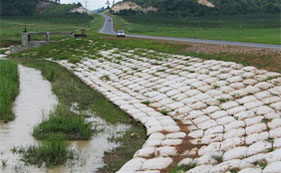
 Back to List
Back to List
Construction method
Do not drag or pull the geomembrane during transportation to avoid injury from sharp objects.
1. Extend from the bottom to the high position, don't pull it too tightly, and leave a margin of 1.50% to prepare for local sinking and stretching. Taking into account the actual situation of the project, the slope shall be laid from top to bottom;
2. The longitudinal joints of two adjacent panels should not be on a horizontal line, and should be staggered by more than 1m;
3. The longitudinal joint should be more than 1.50m away from the dam foot and bend foot, and should be set on a plane;
4. Slope first and bottom of the field;
5. When laying on a slope, the film spreading direction should be basically parallel to the slope line.
layout
1. Before laying the geomembrane, the corresponding qualified acceptance certificate of the civil engineering shall be obtained.
2. Before cutting the geomembrane, the relevant dimensions should be measured accurately, and then cut according to the actual size. Generally, it is not advisable to cut according to the size shown in the figure. It should be numbered piece by piece and recorded in detail on the special form.
3. When laying the geomembrane, we should strive to save the raw materials as much as possible on the premise of quality. It is also easy to quality.
4. The overlap width of the seam between the film and the film is generally not less than 10cm, and the welding seam is usually arranged parallel to the slope, that is, arranged along the slope direction.
5. Generally, in areas with deformed corners, the length of the joint should be as short as possible. Except for special requirements, on slopes with a slope greater than 1:6, within 1.5 meters from the top slope or stress concentration area, there should be no welds as far as possible.
6. During the laying of the geomembrane, artificial wrinkles should be avoided. When the temperature is low, it should be stretched and flattened as much as possible.
7. After the geomembrane is laid, it is necessary to minimize walking and moving tools on the surface of the membrane. Anything that can cause harm to the impermeable membrane should not be placed on the membrane or carried on the membrane to avoid damage to the membrane. Cause accidental damage.